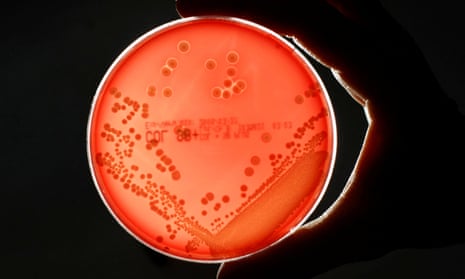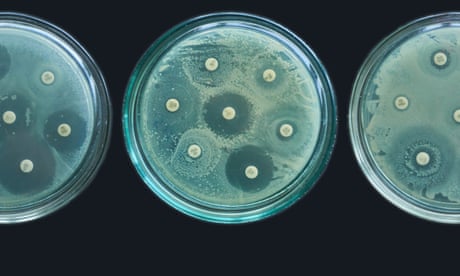Extract from The Guardian

National science agency warns of a ‘post-antibiotic world’ in 2050, marked by declines in lifespan, quality of life and livestock production.
Tue 28 Feb 2023 01.00 AEDT
Last modified on Tue 28 Feb 2023 07.08 AEDTAntimicrobial resistance occurs when microorganisms develop mechanisms to protect themselves against drugs that destroy them, such as bacteria developing antibiotic resistance, or fungi becoming resistant to antifungal medicines.
The report, published by the CSIRO and the Australian Academy of Technological Sciences and Engineering, describes antimicrobial resistance as a “looming global health crisis” with the ability to render some of the most critical drugs to modern medicine ineffective.
“There is a lack of coordination in the efforts against the rise of antimicrobial resistance, significant data siloes across states and sectors, and a need to increase community understanding about the issues and impacts of antimicrobial resistance,” the report found.
“Without this coordination it will be difficult … to tackle the impacts of climate change that can accelerate the emergence and spread of antimicrobial resistance,” it said.
Without urgent action, the report warns of a “post-antibiotic world” in 2050, marked by declines in lifespan, quality of life, and livestock production, with “meat being rare and risky to eat”.
The United Nations has previously predicted that without urgent intervention, drug-resistant microbes would result in 10 million deaths each year globally by 2050.
“The more we use antibiotics, the faster we lose them,” said Dr Branwen Morgan, lead of the Minimising Antimicrobial Resistance Mission at the CSIRO.
“The big thing in Australia … is that we just don’t have enough information,” she told Guardian Australia. “The oncologists say that it’s the second biggest cause of death in cancer patients.”
At a press briefing, Morgan said better data would give experts insights into “what antibiotics are needed in what regions … of the country, because there is a quite a big discrepancy from north to south and east to west around what type of drug resistant infections are most prevalent”.
“In a woman’s lifetime, almost half of all women will have a urinary tract infection,” Morgan said. “We already know that those first-line drugs … the ones that you’re usually given first off, aren’t working. So you have to have a different type of drug from different class of antibiotics – and also, in some cases, these aren’t working either.”
“One of the recommendations of the report is to understand what data needs to be captured in a surveillance system and how that could be standardised, so we get a better picture of what is being given in the animal sector and also in [human healthcare],” she said, adding that Australia had clear guidelines on the strict use of antimicrobials in livestock industries.
On potential solutions, Morgan said: “It’s not as simple as making new drugs to replace those that are failing because discovering new antibiotics is a slow and expensive process. They have a high failure rate – most do not progress to the human clinical trial stage.”
The report focused on emerging technologies that could prevent the spread of antimicrobial resistance.
Sue MacLeman, a fellow of the Australian Academy of Technological Sciences and Engineering, described at the press briefing approaches such as “surface sprays that change colour when they come into contact with dangerous pathogens, neutralising technologies built into our sewerage systems which can detect and disarm harmful microbes before they are flushed out into our waterways, toothbrushes that provide data on our oral health and which self-sterilise after use”.
With global heating, bacteria and other microorganisms grow faster and can spread to new geographical areas, Morgan said. More extreme weather events as a result of the climate crisis, such as flooding, might result in “sewage or storm water overflows … they’re often hotspots for the evolution and dissemination of drug resistant bacteria,” she added.
A previous report, published by the CSIRO and the Australian Antimicrobial Resistance Network in November, estimated that superbugs currently result in 1,000 deaths in Australia each year.

No comments:
Post a Comment